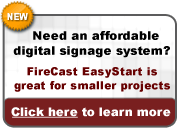Many of the posts on this blog have talked about segmented markets, core customers from specific demographics, and good marketing design that speaks to the right audience. Smart companies develop or streamline their products for the needs of that key group, often with good PR that travels over and beyond the dream demographic. But sometimes companies have to be pushed to recognize that they’re missing out on potential sales. Ten years ago the Wall Street Journal noted that some companies were beginning to notice that people with disabilities were an important market with some disposable income. According to Suzanne Robitaille, approximately 54 million adults-- one in five Americans -- have a physical or mental disability. She argues that “People with disabilities have a combined income of more than a trillion dollars -- and are willing to spend it on products and technologies that make their lives more productive…Brands that ignore the needs of this group relinquish an opportunity to reach this growing demographic.”
For a positive example, note the marketing news about Panasonic's Toughbook laptops which have "carved out a niche among people who use computers under the most trying circumstances -- think utility linemen, the military, construction workers -- but in this age of belt-tightening, marketing executives with the brand are thinking the brand's durability message may play to a wider audience." The success of designing and then selling to that specific market has encouraged Panasonic to create a multi-platform campaign of television, web-based, print, and out-of-home ads that considers how other users might also want a more resiliant laptop. The new campaign, which carries the theme "Toughbooks for a tough world,” is being promoted in airports and on shows like "CNN in the Morning" to capture the business traveler who might not realize the advantages of a more resilient product. In the same way that sportswear and hiking gear morphs into business and street wear, the "tested under extreme circumstances" approach entices users from a slightly different occupational group. Indeed, I suspect Panasonic has not yet exploited the full extent of its crossover from successful niche sales to larger markets. One of its Toughbooks is geared towards doctors -- another group that can appear authoritative or innovative to "regular" consumers. Toughbook provides the "first fully-rugged mobile clinical assistant (MCA), will be one of its many mobile healthcare solutions innovative engineering, resulting from its own proprietary global healthcare industry research and Intel’s mobile clinical assistant (MCA) reference design. The device improves workflow and eases clinical loads for doctors and nurses, helping healthcare organizations maximize efficiency and reduce errors... [It] is a secure and intuitive platform for barcode medication administration (BCMA), vitals capture and electronic medical records (EMR) capture and review." Given the popularity of hospital-based on television, philanthropic work in the field by Doctors without Borders, and concerns about emergency medical response in disasters, Panasonic might also consider how to promote its product even more.


 Subscribe to this blog
Subscribe to this blog
3 comments:
Post a Comment